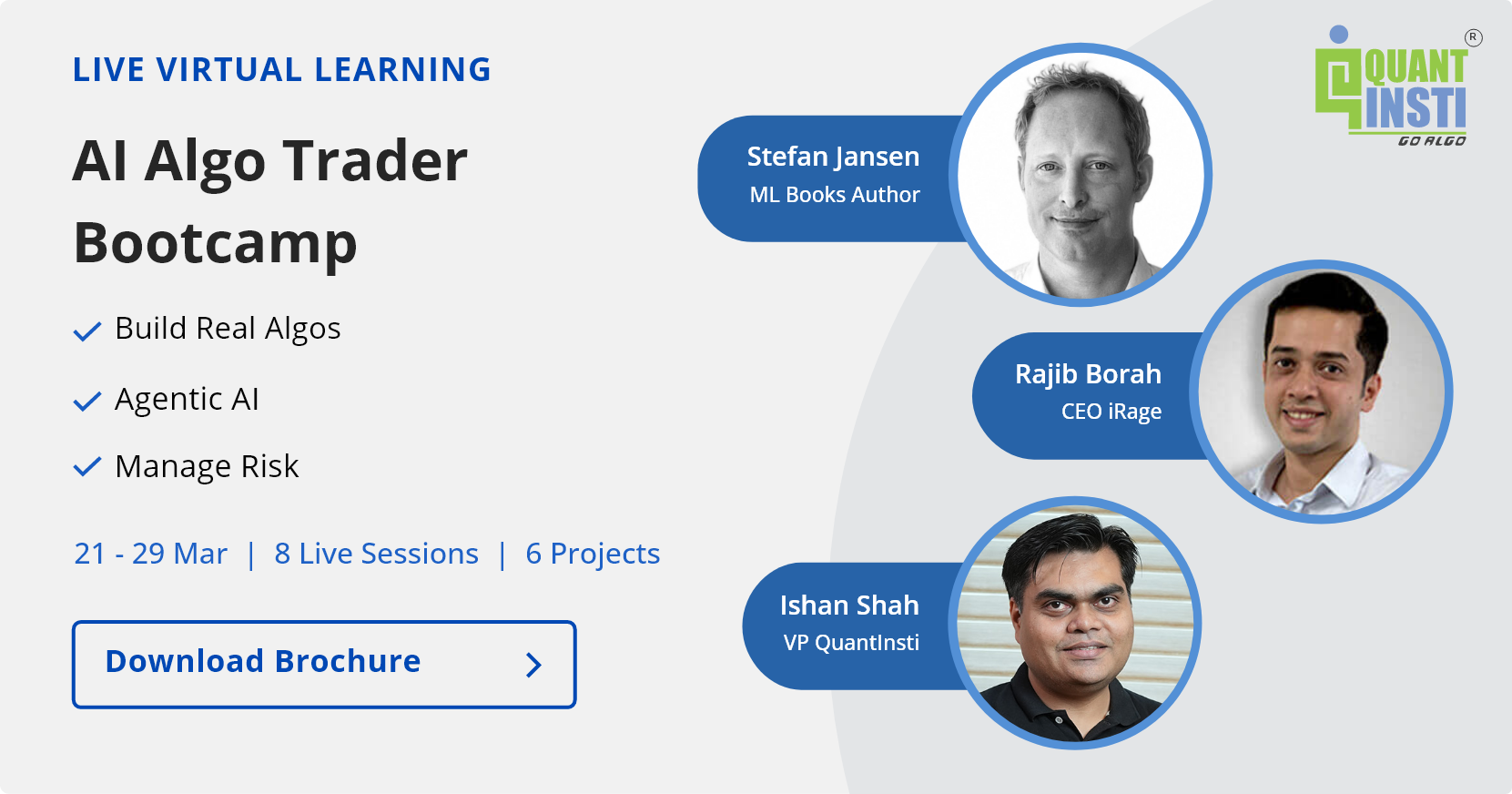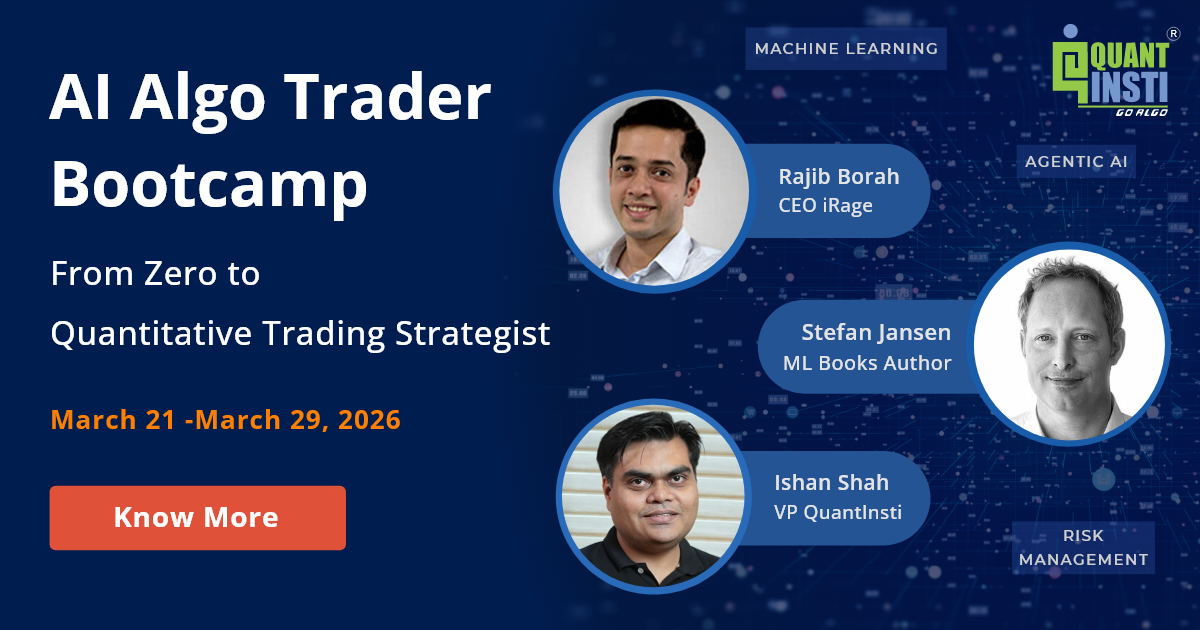Date: June 27 and 28, 2015
Time: 10:00 AM to 5:30 PM
Venue: NSE, Exchange Plaza, C-1, Block-G, Bandra Kurla Complex, Mumbai- 400051
Event Overview
Technology has revolutionized the way financial markets function and the way financial assets are traded. Technology development across global markets has necessitated a multidimensional approach for understanding the Importance of Algorithmic Trading.
It is imperative to develop domain knowledge expertise in quantitative and qualitative algorithmic trading skills. It helps to understand the market in a better manner and often allows us to frame difference strategies as per the market movements.
Given the current market scenario and dynamism, Algorithmic Trading has attracted attention more than ever before. The concepts are multi-fold and are applicable across all financial markets: equities, fixed income, currencies-domestic or global.
In view of this, NSE in association with QuantInsti presented a comprehensive workshop on Algorithmic Trading for analysts, dealers, traders, consultants, and other market practitioners as part of their Management Development Program (MDP)
Management Development Program by NSE
NSE's MDPs aims to enhance the competitiveness of executives of all levels in the financial industry. It is designed to assist professionals to take on a leadership role in their position individually and collectively while improving their knowledge. NSE's MDPs are vital for practising professionals and managers who are keen to take on leadership roles with their organizations.
QuantInsti’s Association with NSE
As the pioneer institute for learning Algorithmic Trading in Asia, our vision at QuantInsti is to expand the reach of Algorithmic Trading to each and every retail and institutional trader, by providing the right knowledge, skills, tools and attitude required to successfully trade in the markets. Our mission is to help every trader across the world to get initiated into the world of Auto trading and benefit from technological innovations.
Thus our faculty established this association with NSE so that attendees can learn from both the rich practical experience of the faculty, as well as from the diverse experience of fellow learners. This was an ideal platform for gaining new insights in order to be successful.
 Rajib Borah at Algorithmic Trading Management Development Program by NSE in 2014
Rajib Borah at Algorithmic Trading Management Development Program by NSE in 2014
In our previous Algorithmic Trading workshop in MDP, our faculty has shed light various algorithmic trading strategies, tool, performance evaluation techniques, portfolio management techniques, rules and regulations. This time our faculty discussed new generation strategies and changes in the trading ecosystem in past few months.
Program Content of 2 Day Workshop
Day 1
Demystifying Algorithmic Trading
|
Speakers
Gaurav Raizada is a Director at iRageCapital Advisory Private Ltd., leads the firm’s advisory practice in India on the Systems, Performance and Strategies. He has consulted extensively with core focus on strategy development and execution including trading systems development, latency reduction, optimization and transaction cost analysis. [/ststaff] Kunal Kumar works in the Trading Strategy Team at iRageCapital Advisory, responsible for developing new strategy along with fine-tuning existing ones. His focus area extends to process automation and maintaining trading infrastructure. Prior to that, he worked at ICICI Bank headquarters in their Treasury team, helping International Institutional clients with their FX, Bonds and Derivatives requirements. He has also interned with Religare Capital Markets in Investment Banking Division and Tata Steel. [/ststaff] Nilesh Koshe works as Quantitative Associate at iRageCapital Advisory in their Derivative strategy team. His focus area is data modelling using machine learning techniques, automating trading decision for algo trading. Prior to iRage Capital, he worked with one of the leading Investment Bank as Derivative Strategist, proving derivatives solution to buy side clients including insurance funds, pension funds etc. He served in Asian and European markets. [/ststaff] Rajib Ranjan Borah is a co-founder and director at iRageCapital & QuantInsti. In the past 10 years, he has worked in various key roles related to automated trading in US, Europe & Asia with pioneering firms from the industry like Bloomberg LP, Optiver LLP, iRageCapital – in roles spanning from designing and trading HFT strategies, technology for low latency trading, and strategy advisory to a consortium for starting a new commodity derivative exchange. A national Olympiad finalist, Rajib has twice represented India at the World Puzzle Championships.
Post completion of this workshop attendees received a lot of theoretical and practical insights about automated trading from our faculty. In order to learn and implement these best practices and strategies, one can join our Executive Programme in Algorithmic Trading (EPAT). It is a 6-month program conducted on the weekends (online as well as in a classroom). We also provide our participants access to various tools and test market data for project purposes.Extensive Courses for Learning Algorithmic Trading and Quantitative Finance
Event Photos










